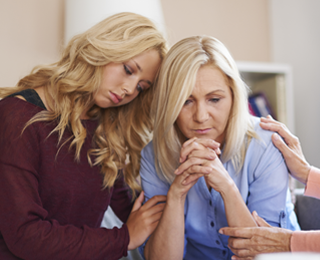We all suffer from bereavement at one time or another. Your pet dies. You lose a job. Your parent dies. Eventually, everyone we love dies. You weep… However, that’s not all that happens when you experience grief.
Symptoms of Grief
Emotional symptoms of grief include depression, anger, helplessness, anxiety, mood swings, and hysteria. Common mental symptoms are forgetfulness, too much or too little sleep, inability to concentrate, confusion, decreased problem-solving ability, low self-image, and self-destructive thoughts. And grief may cause physical symptoms, such as headaches and body aches, chest tightness, fatigue, exhaustion, sensitive skin, dizziness, shortness of breath, increased illness, noise hypersensitivity, heart palpitations, loss of appetite or weight gain. However, for older people, bereavement and grief may expose them to actual physical danger. For people age 60 and older, the risk of heart attack or stroke doubles in the month after bereavement and then slowly declines, research indicates. The risk of developing blood clots in the lungs was 2.5 times higher than average. In people over 65, the activity of neutrophils was diminished. Neutrophils fight bacteria and other infectious agents that could lead to pneumonia and other serious illnesses. Scientists believe that grief disrupts the balance of two stress hormones, cortisol and dehydroepiandrosterone sulphate (DHEAS), among older people. Seniors have more cortisol and less DHEAS after a bereavement, they discovered.
Grief or Disorder?
Most people start feeling a little better by 8 weeks after the bereavement. However, it’s common for older people to hide the extent of their grieving. They’ve been taught not to show emotion. If you believe your parent or older loved one is experiencing prolonged grief, contact their doctor for an assessment. If you or your loved one continue experiencing symptoms of grief after 8 weeks, it’s best to contact a doctor. Get help, especially if you experience suicidal thoughts, depression or difficulty completing daily tasks for more than 2 months. Signs of an inability to manage grief include:
- Unusual lack of hygiene or unkempt appearance
- Isolation
- Continuous sadness or apathy
- Loss of interest in activities the person participated in with the deceased loved one
- Statements about reuniting with the deceased loved one
- Actions that show lack of self-care
- Avoidance of reminders of the loved one’s loss
- Taking blame for the loved one’s death
- Preoccupation with the circumstances of the death
- Increased use of alcohol, tobacco or other substances
Grief is not depression, although some of the symptoms are the same. Experts advise that grief should not be treated in the same manner as depression.
How to Help
If you or a loved one is experiencing grief, you can take some simple actions to prevent it from becoming incapacitating. Talk about it in a positive way. If you’re experiencing grief, get out old love letters or write a letter to your loved one yourself. Start a memorial photo album. If your parent is grief-stricken, talk about their deceased loved one’s funny sayings or habits, go to places they enjoyed, or bring out the family album. Take it easy. Grief imposes a heavy burden. Lighten your load in other ways. Use your support system. After a death, many people come by to offer their condolences, drop off food, and give offers of help. However, 6 months later, most people aren’t actively supporting the bereaved person. Call your friends and family and ask them to keep in touch. Socialize. Get out and be around other people. Volunteer. Get back on social media. Take walks. Join a support group. Find Group Therapy and Support Groups in Massachusetts. Search Psychology Today therapy groups for Adults, CBT, DBT, Mindfulness (MBCT), Coaching, Anxiety, and more. Your local hospital or hospice will have information about local support groups. Call a hotline. The national grief recovery hotline number is (800) 445-4808. The suicide hotline—misnamed because it’s also for people who need to talk—is (800) 273-TALK or 1 (800) 273-8255.
We Care
Sometimes, when you’re going through the throes of grief, it’s easy to view the world as uncaring. At The Arbors Assisted Living, we care. We care not only for our residents but for older adults and caregivers. If you are a caregiver for your parent or an older adult, please take a moment to see if any of these informative articles can help.

